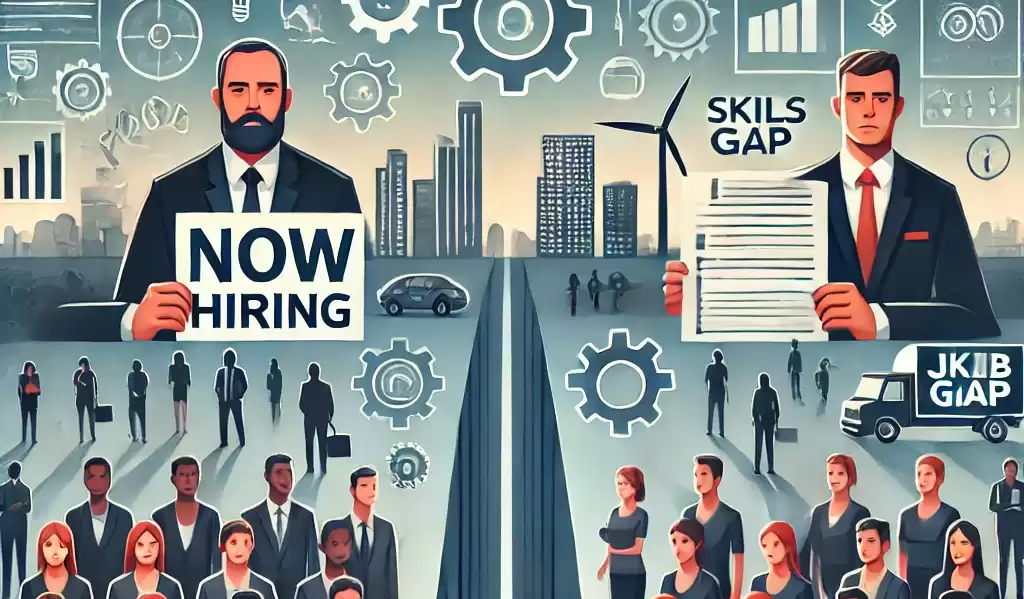Home Blogs Career Why is there a shortage of good jobs and good candidates?
Posted By: Shriji Solutions
30 November, 2024

The job market is an ever-changing ecosystem influenced by economic trends, technological advancements, and changes in social preferences. Despite abundant opportunities and ambitious candidates, a paradox remains: employers struggle to find qualified professionals, while job seekers complain about the lack of quality positions.
This blog highlights the reasons behind this mismatch and provides insight on the current state of the job market.
Understanding the Shortage of Good Jobs
1. Economic Fluctuations
Economic uncertainties play an important role in job shortage. Recession, inflation and global crises may cause companies to cut costs, restrict hiring or eliminate positions altogether. Conversely, during economic booms, organizations may create positions that require specialized skills, which may not align with the available workforce.
2. Technical Disruption
Automation, artificial intelligence (AI) and machine learning are reshaping industries. Although these advances create new opportunities, they often replace traditional roles. For example, tasks that were previously handled by clerks or manual workers are now managed by software, reducing the demand for less skilled workers.
3. Shift towards Gig Economy
The rise of the gig economy has led to an increase in temporary, freelance, and part-time work, reducing the availability of traditional long-term employment. While this model is a good fit for some people, many candidates seeking stability and benefits find fewer full-time opportunities.
4. Geographical Imbalance
Opportunities are often concentrated in specific areas, such as urban centers or tech hubs. Candidates living in rural areas may lack access to good jobs due to logistical barriers, leading to regional disparities in employment.
Why Are There Less Good Candidates?
1. Skills Mismatch
One of the major reasons for lack of good candidates is lack of skills. The rapid growth of industries has left the education system behind, leaving graduates unprepared for current job demands. Employers often find that applicants lack technical expertise or soft skills such as communication and problem-solving.
2. Lack of Practical Experience
Many candidates have theoretical knowledge but lack practical experience. Employers prefer professionals who can work at the grassroots level, and internships or project-based learning opportunities are not always available to all students.
3. Unrealistic Expectations
Both employers and candidates sometimes have unrealistic expectations. Candidates may demand higher salaries, flexible work environments, and rapid career progression, while employers may expect broad skill sets from candidates without providing adequate training.
4. Lack of Adaptability
Many candidates are reluctant to upskill or reskill, limiting their relevance in the ever-changing job market. This resistance to change further widens the gap between job requirements and the candidate's abilities.
Role of Education and Training
1. Old Syllabus
Educational institutions often lag behind in updating their curriculum to reflect the needs of the industry. For example, many universities still prioritize theoretical knowledge over practical applications in areas such as technology and management.
2. Limited Focus on Emerging Sectors
Areas like data science, cyber security and renewable energy have emerged as increasingly in-demand sectors. However, training programs in these areas are not universally accessible, leaving gaps in the talent pool.
What Can Be Done?
1. Bridging the Skills Gap
Companies and educational institutions should collaborate to design programs that equip students with relevant skills. Apprenticeships, vocational training and continuing education initiatives can help bridge the skills gap.
2. Leveraging Technology for Hiring
Organizations should adopt technology to improve their recruitment processes. AI-powered recruiting tools can identify candidates who have the desired skills and capabilities, even if their resume does not directly reflect this.
3. Encouraging Flexibility
Employers should invest in training and development for employees, encouraging candidates to upskill and adopt flexible working arrangements.
4. Promote Lifelong Learning
Governments, employers and educators should encourage lifelong learning through accessible courses and certifications, allowing workers to remain relevant.
Conclusion
The mismatch between job opportunities and qualified candidates arises from a complex interplay of economic, technological and social factors. While challenges remain, proactive measures such as skill upgrading, collaboration and embracing adaptability can create a more balanced and dynamic job market.
For those looking for careers in IT, web development and other in-demand fields, Shriji Solutions Provides extraordinary opportunities. From innovative IT roles to guidance in shaping your skills, Shriji Solutions is here to support your professional journey. Let's work together to bridge the gap between talent and opportunity!

